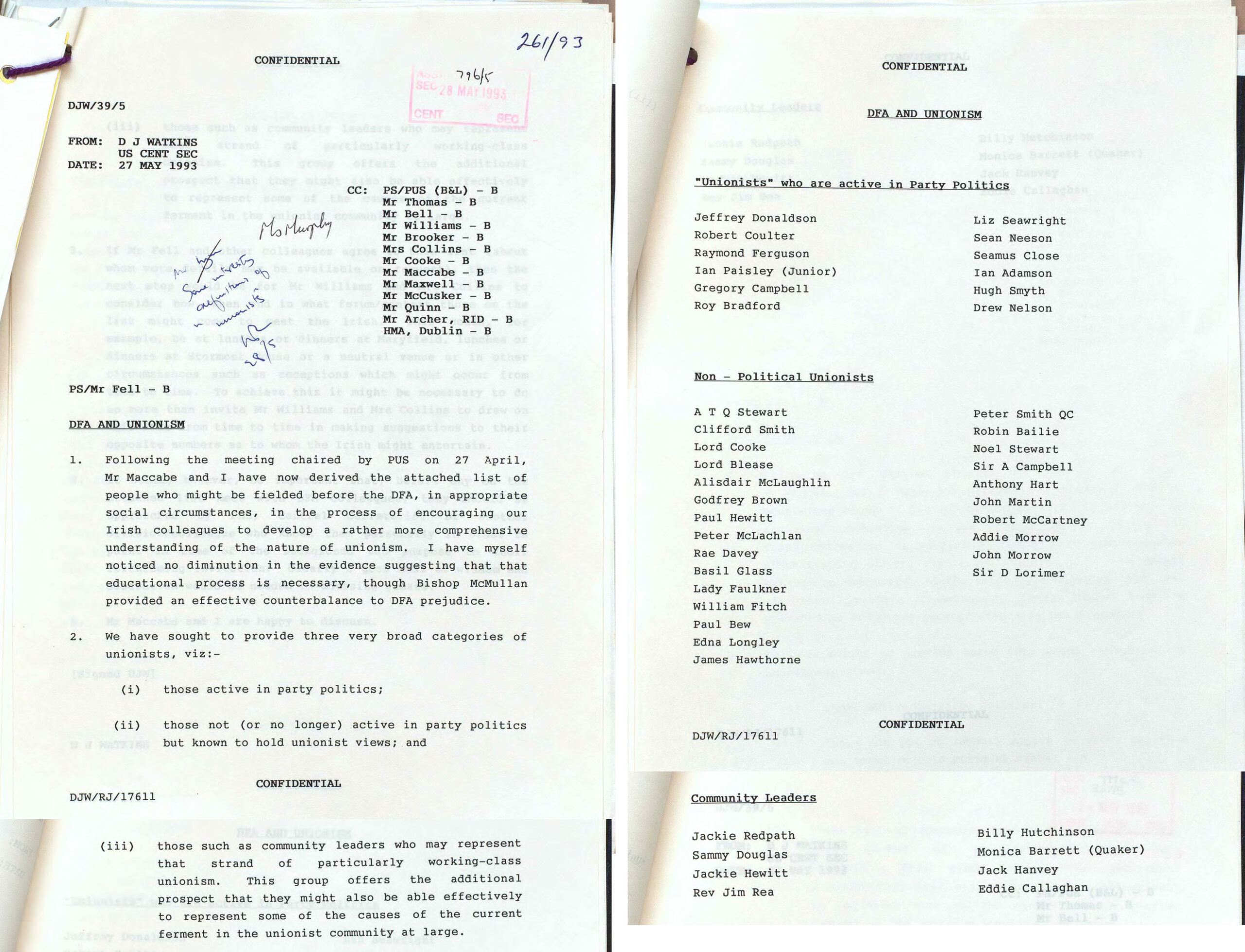
An internal memorandum produced by an official in the Northern Ireland Civil Service in May 1993. It is reporting on a plan to arrange a meeting between representatives of Unionism in Northern Ireland and the Irish Government’s Department of Foreign Affairs (DFA)
Context notes
When Northern Ireland was created in 1921 there was a great deal of hostility and bitterness in the rest of Ireland. Many Irish politicians and officials felt that Ireland should be united, and that Northern Ireland should not exist. By the 1990s this hostility towards Northern Ireland was greatly reduced. However, there was a problem that many in the Irish Government were unsympathetic towards Northern Ireland’s Unionist community. It was felt that many in Irish public life and its institutions regarded Unionists with suspicion, and thought they were simply pawns of the British government.
Transcript
CONFIDENTIAL
DJW/39/5 FROM: DJ WATKINS US CENT SEC
DATE: 27 MAY 1993
CC: PS/PUS (B&L) – B Mr Thomas – B Mr Bell – B Mr Williams – B Mr Brooker – B Mrs Collins – B Mr Cooke – B Mr Maccabe – B Mr Maxwell – B Mr Mccusker – B Mr Quinn – B Mr Archer, RID – B HMA, Dublin – B
PS/Mr Fell – B
DFA AND UNIONISM
- Following the meeting chaired by PUS on 27 April, Mr Maccabe and I have now derived the attached list of people who might be fielded before the DFA, in appropriate social circumstances, in the process of encouraging our Irish colleagues to develop a rather more comprehensive understanding of the nature of unionism. I have myself noticed no diminution in the evidence suggesting that that educational process is necessary, though Bishop McMullan provided an effective counterbalance to DFA prejudice.
- We have sought to provide three very broad categories of unionists, viz:-
(i) those active in party politics;
(ii) those not (or no longer) active in party politics but known to hold unionist views; and
(iii) those such as community leaders who may represent that strand of particularly working-class unionism. This group offers the additional prospect that they might also be able effectively to represent some of the causes of the current ferment in the unionist community at large.
DFA AND UNIONISM
“Unionists” who are active in Party Politics
Jeffrey Donaldson
Robert Coulter
Raymond Ferguson
Ian Paisley (Junior)
Gregory Campbell
Roy Bradford
Liz Seawright
Sean Neeson
Seamus Close
Ian Adamson
Hugh Smyth
Drew Nelson
Non – Political Unionists
AT Q Stewart
Clifford Smith
Lord Cooke
Lord Blease
Alisdair McLaughlin
Godfrey Brown
Paul Hewitt
Peter McLachlan
Rae Davey
Basil Glass
Lady Faulkner
William Fitch
Paul Bew
Edna Longley
James Hawthorne
Peter Smith QC
Robin Bailie
Noel Stewart
Sir A Campbell
Anthony Hart
John Martin
Robert McCartney
Addie Morrow
John Morrow
Sir D Lorimer
Questions
Content
- What event is this document trying to organise?
- What types of people do the officials plan to invite?
Inferences from the content
- Is this source more useful as evidence about the Irish DFA officials or about the British official writing it?
- What can historians infer about the relationship between the Northern Ireland Civil Service and the Irish DFA?
Inferences from the context
- Explain why it is significant that this meeting was being organised.
- Explain why it is useful to see who got a copy of this document.
